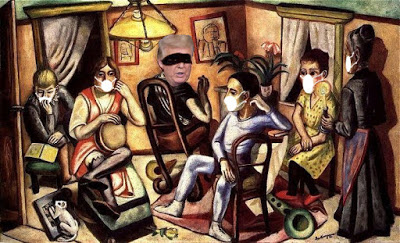"The helpless fixation on notions of security and property deriving from past decades keeps the average citizen from perceiving the quite remarkable stabilities of an entirely new kind that underlie the present situation." -- Walter Benjamin Vor Dem Maskenball (with updates) -- Max Beckmann, 1922 The contemporary relevance of the section titled "Imperial Panorama: A Tour of German Inflation" from Walter Benjamin's One-Way Street never ceases to astonish me. Yesterday I finally understood what Benjamin meant by "German inflation." I had mistaken it for the name of an event, like "Great Depression" or "World War I" that referred to a monetary phenomenon in the Friedmanite sense of "inflation is always and everywhere a monetary phenomenon." I had attributed to it an ironic, metaphorical
Topics:
Sandwichman considers the following as important:
This could be interesting, too:
Robert Vienneau writes Austrian Capital Theory And Triple-Switching In The Corn-Tractor Model
Mike Norman writes The Accursed Tariffs — NeilW
Mike Norman writes IRS has agreed to share migrants’ tax information with ICE
Mike Norman writes Trump’s “Liberation Day”: Another PR Gag, or Global Reorientation Turning Point? — Simplicius
"The helpless fixation on notions of security and property deriving from past decades keeps the average citizen from perceiving the quite remarkable stabilities of an entirely new kind that underlie the present situation." -- Walter Benjamin
 |
| Vor Dem Maskenball (with updates) -- Max Beckmann, 1922 |
The contemporary relevance of the section titled "Imperial Panorama: A Tour of German Inflation" from Walter Benjamin's One-Way Street never ceases to astonish me. Yesterday I finally understood what Benjamin meant by "German inflation." I had mistaken it for the name of an event, like "Great Depression" or "World War I" that referred to a monetary phenomenon in the Friedmanite sense of "inflation is always and everywhere a monetary phenomenon." I had attributed to it an ironic, metaphorical sense in which the "stupidity and cowardice" with which the German bourgeoisie insensibly confronted the "silent, invisible power" was "like" the rapidly evaporating value of the banknotes.
But no. The German inflation was not a metaphor for cultural impotence. It was not an event or a monetary phenomenon. The German inflation was literally that cultural impasse, that ineffectual nostalgia for foregone "stabilities" that had benefited those pining for them. Benjamin's "Imperial Panorama" was a diagnosis that "inflation is always and everywhere a cultural phenomenon."
Who knew that the economists have been lying to us about inflation? If prices go up by ten percent and wages go up by ten percent, that is inflation. If prices go up by five percent and wages don't go up at all -- voila! no inflation! "Austerity" policies, in which the price of previously public goods goes up by infinity, is not inflation -- because it is "anti-inflation."
In this cultural diagnosis of inflation, the hyper-inflation of 1923 was not something that came out of the blue in the 1920s. Nor were the printing of banknotes, the financing of the war or the demand of the Allies for reparations the cause. They were symptoms that aggravated the malaise. The inflationary die was cast long before the war.
"things can't go on like this"
